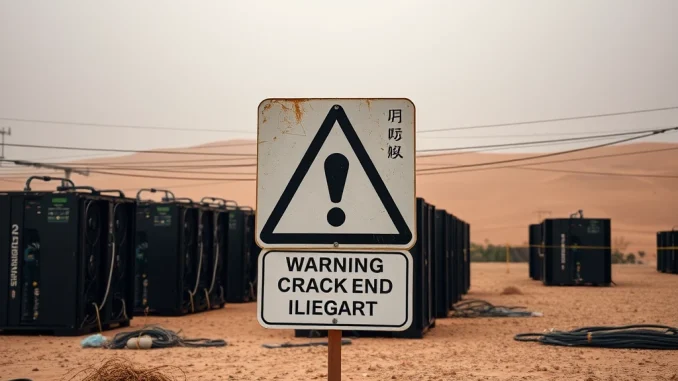
Kuwait has fired a stern warning shot across the bow of illicit cryptocurrency operators. Authorities in the Gulf nation are cracking down on what they describe as widespread illegal crypto mining activities, highlighting significant concerns about power consumption and regulatory compliance. This move comes amidst an existing nationwide ban on most crypto-related activities, signaling a firm stance from the government.
Kuwait Crypto Mining Under Scrutiny: The Official Warning
The warning originated from Kuwait’s Ministry of Interior, shedding light on a growing issue within the country’s borders. According to a report by Decrypt, officials have identified a staggering number of potential sites engaged in unauthorized mining operations. Data suggests that over 1,000 locations across Kuwait may be housing mining rigs, operating outside the bounds of the law.
The primary concern flagged by authorities isn’t just the act of mining itself, but the associated strain on national resources, particularly electricity. Crypto mining, by its nature, is an energy-intensive process, requiring powerful computers running around the clock. This leads directly to the issue of abnormal electricity use.
Why Is Illegal Crypto Mining a Problem in Kuwait?
Understanding the ‘why’ behind Kuwait’s crackdown is crucial. Here are the key reasons illegal operations are causing concern:
- Massive Power Consumption: Mining rigs consume vast amounts of electricity. Operating over 1,000 sites illegally puts a significant, unmanaged burden on Kuwait’s power grid.
- Electricity Misuse Crypto: Kuwait, like many Gulf nations, heavily subsidizes electricity. Illegal miners are effectively using subsidized power for commercial gain without authorization, constituting electricity misuse.
- Grid Stability: Uncontrolled, large-scale power draw from hidden mining farms can potentially impact the stability and reliability of the national power supply for regular citizens and businesses.
- Regulatory Evasion: Operating illegally means bypassing any potential oversight, taxation, or energy efficiency standards the government might wish to impose.
Context: Kuwait’s Existing Crypto Ban
It’s important to note that this warning doesn’t appear in a vacuum. Kuwait implemented a comprehensive ban on most cryptocurrency activities in July 2023. This ban explicitly prohibits:
- Trading cryptocurrencies
- Using cryptocurrencies for payments
- Investing in virtual assets
- Operating virtual asset platforms
While the initial ban didn’t explicitly mention mining, an activity that creates new crypto rather than trading existing assets, operating mining rigs clearly falls under ‘crypto activity’ and relies heavily on infrastructure (like electricity) that is now being scrutinized under the umbrella of illegal operations, especially given the context of the broader Kuwait crypto ban.
Consequences for Illegal Crypto Mining Operations
Authorities are not just issuing a polite request; they are backing their warning with the threat of legal consequences. While specific penalties weren’t detailed in the initial report, operating any large-scale, unregulated activity that misuses state resources and potentially violates a broader ban can lead to severe repercussions, including:

(Note: The image tag above is illustrative based on the rules provided; an actual image URL would be needed)
- Heavy fines
- Confiscation of mining equipment
- Potential imprisonment
- Legal action related to electricity theft or misuse
The government’s warning serves as a clear message: these operations are on their radar, and they are prepared to act.
Global Perspective: Crypto Mining Regulations
Kuwait’s situation is not unique. Governments worldwide are grappling with how to regulate cryptocurrency mining. Concerns over energy consumption have led to bans or strict regulations in countries like China, while others are exploring ways to integrate mining into renewable energy initiatives or tax its energy use. The focus on electricity misuse crypto is a common theme when unregulated mining proliferates in regions with subsidized power or strained grids.
This global trend underscores the challenges authorities face in monitoring decentralized digital activities and their real-world impact on infrastructure and resources.
Summary: A Clear Warning from Kuwait
In conclusion, Kuwait’s Ministry of Interior has issued an urgent warning regarding widespread illegal crypto mining operations. With estimates pointing to over 1,000 potential sites, the government’s primary concerns are the significant abnormal electricity use and the violation of regulatory norms, including the existing Kuwait crypto ban on general crypto activities. Authorities have explicitly warned violators of impending legal consequences, signaling a zero-tolerance approach to illegal crypto mining and associated electricity misuse crypto. This development is a potent reminder of the regulatory challenges and energy debates surrounding crypto mining globally, emphasizing the need for clear crypto mining regulations where such activities are permitted.



